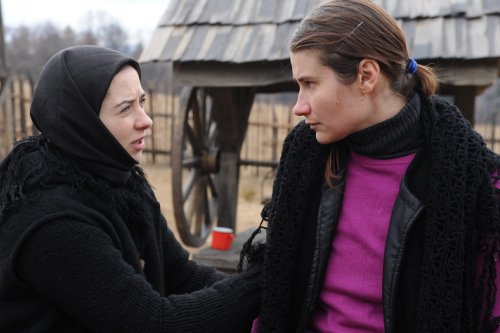Reviews - Beyond The Hills
Beyond The Hills
Reviewed By John Porter

Beyond The Hills
A tale of hardship, religious fervor, escape and confinement, Cristian Mungiu's 'Dupa dealuri/Beyond the Hills' is many things, but within its bleak heart lies a simple love story. We are in Romania, and a train is arriving from Germany. Following the thick plait of a girl's dark hair as she pushes through the throngs of disembarking passengers, it becomes clear that she is looking for one person in particular. The girl is Voichita (Cosmina Stratan), and the one she seeks is Alina (Cristina Flutur), a friend from the orphanage where the pair grew up, and her ex-lover.
From the opening shot the style of the forthcoming movie is announced, a style that is perfectly consistent and coherent through to the final seconds. Firstly, the action is photographed in long takes, often one shot per scene, so although cuts are few and far between, when they do happen they are a definite shift in the forward motion of the narrative; next, Mungiu is extremely specific in what he isolates as the subject for each shot, and how this progresses the story; and lastly, there is no dwelling upon whatever character, conversation or movement this subject happens to be. We see what we need to see, meaning that the cuts also come sharply, leaving little time for diversion away from the movies themes.
What results is beautifully concise and concentrated, yet never hurried or pushy. The lack of cutting gives an unobtrusive style, one which almost borders on the plainly observational, yet because of its fixation with following the plight of the two lovers and their internal struggles and not pondering on anything but, equally never feels ambling. Mungiu has found a very special, balanced standpoint for his movie: We are observing with minimal interference, but observing very specifically.
Voichita walks Alina up the hills on the outskirts of town to her new home, a tumbled convent, where we learn that the latter hopes her old flame will run away with her back to Germany and find work on a boat. The nunnery, once the protagonists are there, is where the audience will remain too, aside from a couple of brief excursions into the hustle and bustle below. However the immersive nature of Mungiu's style is such that the town is virtually forgotten until the final scenes, the important locations instead being Germany, which is talked of as some means of escape, and the subtle claustrophobia of the convent.
As the chores of daily life in the service of Christ are shown to Alida, it becomes obvious that Voichita will not be swayed into leaving, and that God is her new love. Alida, whom the audience already knows has problems with depression and emotional outbursts, keeps mithering her friend for the answer she desires, and finally boils over in a threat of suicide and an attack on another of the nuns.
The long shots which present the story, as previously mentioned, are not dwelt upon past the point of narrative momentum, so we are constantly swept along by the proceedings. This definite concentration onto storyline, albeit in the measured pacing of medium close-up after medium close-up, ensures that the movie is always progressing, and the love affair which drives it remains prominent and emotional throughout. The director also steers clear of a monotonous atmosphere by avoiding visual repetition, which is so often the result of such languid cinematography. This is echoed in the compositions, that although sometimes sparse, are never fully static. These aspects contribute an unusual kineticism and drive to what is essentially a slow film. For example in a sequence where our focus is obviously Alina sitting listening to the reading of numbered sins, we have a nun by her side knitting, constantly stopping the flow and explaining the details over her clicking needles. In a later scene where the Father (Valeriu Andriuta) is being questioned by police in his chapel, and the shocked Voichita stands unblinking in pale wool adrift from the black clothed convent residents, the foreground is a seething mass of hunched, weeping nuns. Whenever we have mental turmoil in a figure who is physically still, we also have movement elsewhere in the frame, keeping a visual interest beyond the psychological aspects of the situation, and simultaneously emphasising the motionless state of our subject, predominantly Voichita or Alida.
The preference for elongated, static takes, also means that the film rarely uses close-ups. When one does come, it seems somehow jarring, which is utilised for maximum effect in moments of violence such as Alida's gagged face when she is hogtied by the sisters, and the restraining of her wrists with dog chains to a makeshift cross.
The issue of religion and spiritual love, as opposed to physical love and the connection between people is continually explored in the girls' relationship, but what kind of religion is this? The convent is an establishment that will take money from its members, deal out punishments and stand for no deviation from its rules, yet the Priest also hypocritically questions whether a girl outside has, "joined a cult". There is also an uncertain air over the legitimacy of the Father, and how young people end up in monasteries, which is hinted as being through poverty and coercion. What kind of affection between people has a place within this religion? "Will you love me if I let God into my heart?" Alida pleads. The world of 'Beyond the Hills' is one of desperation and hope, which comes to an end with the ancient rituals of exorcism being chanted on a girl who may be simply a little mentally askew, or just very deeply in love.
When the police van takes the nuns and Father into town, they stop before a workman drilling up the road. Amidst the din of jack-hammers, lorries, the inane chatter of the policemen and modern life, the audience realises how isolated from this they have been in the convent, and the extent of all that they have seen. When the final flourish of the movie arrives, seamlessly reframing before the last action and cut, it is sublime, and somehow calls into question the importance of everything that we have been embroiled in for two and a half riveting hours.
From the opening shot the style of the forthcoming movie is announced, a style that is perfectly consistent and coherent through to the final seconds. Firstly, the action is photographed in long takes, often one shot per scene, so although cuts are few and far between, when they do happen they are a definite shift in the forward motion of the narrative; next, Mungiu is extremely specific in what he isolates as the subject for each shot, and how this progresses the story; and lastly, there is no dwelling upon whatever character, conversation or movement this subject happens to be. We see what we need to see, meaning that the cuts also come sharply, leaving little time for diversion away from the movies themes.
What results is beautifully concise and concentrated, yet never hurried or pushy. The lack of cutting gives an unobtrusive style, one which almost borders on the plainly observational, yet because of its fixation with following the plight of the two lovers and their internal struggles and not pondering on anything but, equally never feels ambling. Mungiu has found a very special, balanced standpoint for his movie: We are observing with minimal interference, but observing very specifically.
Voichita walks Alina up the hills on the outskirts of town to her new home, a tumbled convent, where we learn that the latter hopes her old flame will run away with her back to Germany and find work on a boat. The nunnery, once the protagonists are there, is where the audience will remain too, aside from a couple of brief excursions into the hustle and bustle below. However the immersive nature of Mungiu's style is such that the town is virtually forgotten until the final scenes, the important locations instead being Germany, which is talked of as some means of escape, and the subtle claustrophobia of the convent.
As the chores of daily life in the service of Christ are shown to Alida, it becomes obvious that Voichita will not be swayed into leaving, and that God is her new love. Alida, whom the audience already knows has problems with depression and emotional outbursts, keeps mithering her friend for the answer she desires, and finally boils over in a threat of suicide and an attack on another of the nuns.
The long shots which present the story, as previously mentioned, are not dwelt upon past the point of narrative momentum, so we are constantly swept along by the proceedings. This definite concentration onto storyline, albeit in the measured pacing of medium close-up after medium close-up, ensures that the movie is always progressing, and the love affair which drives it remains prominent and emotional throughout. The director also steers clear of a monotonous atmosphere by avoiding visual repetition, which is so often the result of such languid cinematography. This is echoed in the compositions, that although sometimes sparse, are never fully static. These aspects contribute an unusual kineticism and drive to what is essentially a slow film. For example in a sequence where our focus is obviously Alina sitting listening to the reading of numbered sins, we have a nun by her side knitting, constantly stopping the flow and explaining the details over her clicking needles. In a later scene where the Father (Valeriu Andriuta) is being questioned by police in his chapel, and the shocked Voichita stands unblinking in pale wool adrift from the black clothed convent residents, the foreground is a seething mass of hunched, weeping nuns. Whenever we have mental turmoil in a figure who is physically still, we also have movement elsewhere in the frame, keeping a visual interest beyond the psychological aspects of the situation, and simultaneously emphasising the motionless state of our subject, predominantly Voichita or Alida.
The preference for elongated, static takes, also means that the film rarely uses close-ups. When one does come, it seems somehow jarring, which is utilised for maximum effect in moments of violence such as Alida's gagged face when she is hogtied by the sisters, and the restraining of her wrists with dog chains to a makeshift cross.
The issue of religion and spiritual love, as opposed to physical love and the connection between people is continually explored in the girls' relationship, but what kind of religion is this? The convent is an establishment that will take money from its members, deal out punishments and stand for no deviation from its rules, yet the Priest also hypocritically questions whether a girl outside has, "joined a cult". There is also an uncertain air over the legitimacy of the Father, and how young people end up in monasteries, which is hinted as being through poverty and coercion. What kind of affection between people has a place within this religion? "Will you love me if I let God into my heart?" Alida pleads. The world of 'Beyond the Hills' is one of desperation and hope, which comes to an end with the ancient rituals of exorcism being chanted on a girl who may be simply a little mentally askew, or just very deeply in love.
When the police van takes the nuns and Father into town, they stop before a workman drilling up the road. Amidst the din of jack-hammers, lorries, the inane chatter of the policemen and modern life, the audience realises how isolated from this they have been in the convent, and the extent of all that they have seen. When the final flourish of the movie arrives, seamlessly reframing before the last action and cut, it is sublime, and somehow calls into question the importance of everything that we have been embroiled in for two and a half riveting hours.
Find A Film
Search over 1500 films in the Keswick Film Club archive.
Friends
KFC is friends with Caldbeck Area Film Society and Brampton Film Club and members share benefits across all organisations
Awards
Keswick Film Club won the Best New Film Society at the British Federation Of Film Societies awards in 2000.
Since then, the club has won Film Society Of The Year and awards for Best Programme four times and Best Website twice.
We have also received numerous Distinctions and Commendations in categories including marketing, programming and website.
 Talking Pictures
The KFC Newsletter
Talking Pictures
The KFC Newsletter
Links Explore the internet with Keswick Film Club


